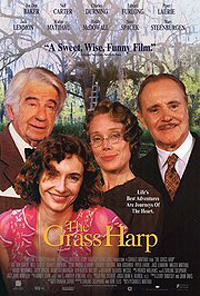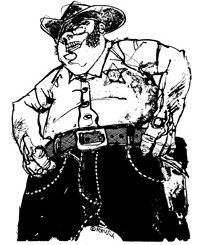 The Grass Harp
The Grass Harp
with Piper Laurie, Sissy Spacek, Walter Matthau
Written by Truman Capote
Directed by Charles Matthau
by Kerry Joyce
Based on a novel by Truman Capote (The Dick Cavett Show, 1970) The Grass Harp has more stars in it than It’s A Mad Mad Mad Mad World, but in the end, as well as in the beginning and middle, this fillúm turned out to be more stomach churning than pages 77-79 of In Cold Blood, another novel by Truman Capote (The Dick Cavett Show,1971).
If you want to know what the big deal is about directors, go and see this movie. Then you’ll learn how poor direction can whip even a good script and an all-star cast into baked stuffed blather. Truman Capote is one of the most important American writers of this old century, and the movie script here is taken almost entirely from his novel. At the very least, Capote is to the 20th century what Nathaniel Hawthorne was to the 19th, and will be so judged by future generations. That is, if they bother. In case you missed the obituary, The Novel died exactly ten years ago, when Tom Wolfe published Bonfire of the Vanities, the last novel read and discussed by a cross section of American readers.
Maybe this will not only be the last century to produce a great novel but also the last where any novel existed in its own time as something other than a TV substitute for whiling away the time when on the beach or the commuter rail.
In The Grass Harp, his first novel, Capote demonstrated his exhilarating mastery of language, combined with some interesting psychological insight, and the kind of gift for vivid physical description that mattered in 1946, but is now seemingly obsolete.
Typical of the obligatory and often delightful coming of age novel, we are presented with a semi-autobiographic if muted account of Capote himself, a Mississippi boy at heart, who has the misfortune of growing up into an incredibly brilliant fag.
Like Bonfire of the Vanities, the movie, this film adaptation of The Grass Harp is a painful parody of itself, and not even brilliant performances by Sissy Spacek, Piper Laurie, and Mary Steenburgen can save it.
Is this just a string of bad luck, or have we become so divorced from our literary heritage that films like East of Eden, The Treasure of the Sierra Madre, The Dead, and other great literature-based films are now a thing of the past? We can only hope that we are dealing here only with a sad coincidence and that in this instance it was simply a matter of a director badly squandering the rich resources at his disposal.
Rule #172 of the filmmakers guide clearly states: “If you’re going to make a corset flick, it must come off, or at the very least, star Michelle Pfeiffer.” But corsets can’t very well come off if there aren’t any corsets to begin with. And these amusingly (in the book) eccentric characters would be pretty unconvincing in corsets anyway.
And another thing. Thanks to this movie, we can now add yet another to Hollywood’s long list of mortal sins: Right alongside gratuitous sex and violence, we should add gratuitous Spanish moss. Spanish moss that looks like it was hung by an epileptic old gaffer, whose only previous experience was laying tinsel in The Christmas That Almost Wasn’t.
Imagine, if you can, a movie where a group of proverbially proper Southern townsfolk are trying unsuccessfully to coax Nell Carter (among others) out of a tree fort, and managing nothing but a forced laugh.
Imagine a director so perverse that he installs his father in a central role just so he can have him spout off adages and aphorisms like some reluctantly backwards Polonius, and without a hint of irony.
If you want a Southern coming of age film based on a novel by an American literary giant, try William Faulkner’s The Reivers (1968), starring Steve McQueen. If you want the rich comedy of Nell Carter, check out reruns of Gimme’ A Break. If you want a quick read by one of America’s greatest writers and grandest personalities, check out The Grass Harp from your local library.



